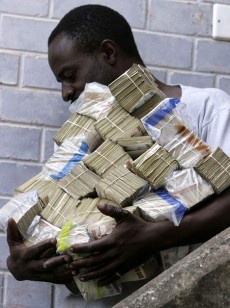Financial leakages in the public sector, which cost the economy between GHc1-2 billion annually, must be sealed if Ghana is to minimise aid-dependency and excessive government borrowing, Prof. Cletus Dordunoo, an economist and international consultant, has said.
He was speaking as a panellist at last week's Ghana Economic Forum in Accra, where participants attempted to find a solution to the country's vulnerable dependence on foreign aid to execute its national budget and finance development.
The discussions came in Finance Minister Seth Terkper's disclosure that donors have withheld direct budgetary support worth 700 million in the past two years.
The donors' action was in response to government's large budget overruns in 2012 and 2013 -- and the inability of some ministries to meet conditions for disbursement of grants.
The situation has increased pressure on the government's domestic revenues, which have to be supplemented by more borrowing to plug the fiscal hole created by suspension of grants.
Last year, only 35 percent of the expected GH¢l.26 billion grants from donors was received. The practical impact of this is accentuated by the structure of government finance, whereby domestic revenues are dedicated to paying salaries and interest while grants help to shore-up capital expenditure.
The suspension of disbursement therefore strikes at the heart of the capital and development budgets, from which most infrastructure and social intervention programmes are financed. In 2013, the capital budget registered a shortfall of GH¢800million.
Prof. Dordunoo believes Ghana's over-reliance on aid and the ballooning budget deficit can be curbed if measures are taken to limit financial haemorrhage in the public sector.
“Cash-bleeding is causing more harm than one can think of. If you read the Auditor- General's reports, you would see that we are losing billions from cash-bleeding.”
Proposing that the country puts into effect the principles of Transparency, Accountability and Probity (TAP), Prof. Dordunoo declared: “Never allow anybody to run away with the loot”. He was also worried about undue delays in the award of contracts within government, saying, “a waste of time is a waste of money”.
The government's finances are in a dire state, the professor added. “We have to borrow to even pay interest on our debt. As a country, we need to cut our coat according to our cloth.”
In 2013, government exceeded its borrowing target - adding GH¢l.5 billion more debt to its initially projected GH
“Trade financing is also a bleeder,” Prof. Dordunoo said. “We can acquire some materials locally, but we prefer foreign products. If we produced a lot of what we consume in this country, we would not be where we are today."
Business News of Tuesday, 18 March 2014
Source: B&FT
Financial leakages in public sector ruining economy - economist

















